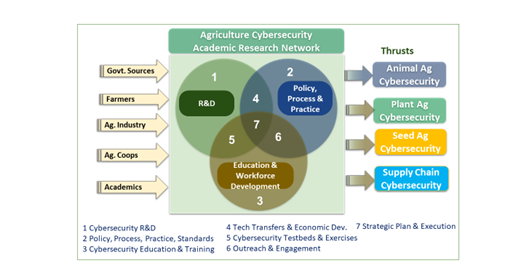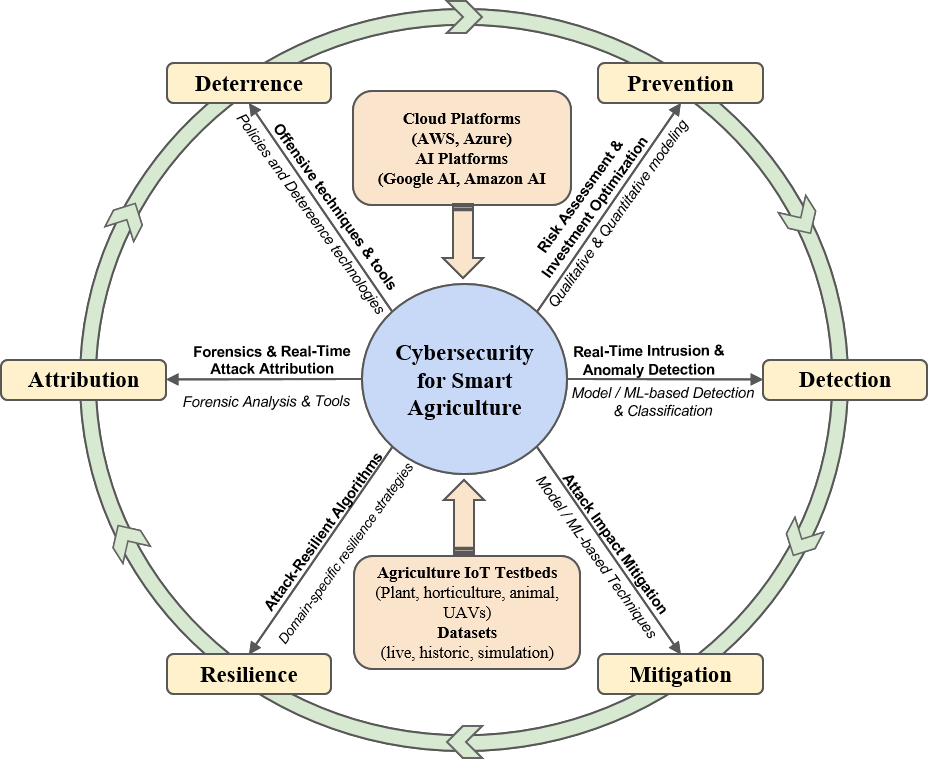ISU Presidential Interdisciplinary Research Initiative: Cybersecurity for Smart Agriculture
Rationale and Vision
In recent years, agriculture and engineering fields have undergone significant transformative changes, partly propelled by the adoption of innovative cyber technologies for sensing, analytics, intelligent decision-making, and real-time control applications. In particular, the Internet of Things (IoT) architecture is emerging as the primary driver for what can be called the smart agriculture framework. While the adoption of cyber technologies promises considerable benefits to discovery, innovation, and productivity in the fields of seed science, plant science, and animal science, it also exposes the agriculture ecosystem to various form of cyberattacks that includes false data injection attacks, denial of service attacks, disruption of sensor networks, unauthorized data leaks, and data privacy attacks. Such attacks can significantly affect productivity, safety, and data privacy, which could have major economic impacts. The US DHS CISA recently recognized cybersecurity’s importance for the agricultural sector and articulated plausible cybersecurity threats.
In response to the grand challenge of “advancing data-driven discovery and secure cyber systems,” this initiative envisions the creation of a nationally reputable research center at Iowa State University in the area of “Cybersecurity for Smart Agriculture,” focusing on interdisciplinary research, education, and outreach at the intersection of food, agriculture, and cybersecurity. The Center will serve as the hub of a consortium of public universities, private companies, and government entities that will help mitigate cyber vulnerabilities in the food and agricultural domains. This vision will be realized through strong interdisciplinary collaboration among ISU researchers, synergistic alliance with major universities that have strong agriculture and cybersecurity research programs, partnerships with industries and farmer cooperatives, local/state government farm organizations, and other stakeholders, as shown below.

Initiative Focus and Activities
Research:
The Center for Cybersecurity for Smart Agriculture will conduct leading-edge research in the long term to address the cybersecurity and data privacy challenges associated with the emerging smart agriculture ecosystem. The figure shows the schematic of the long-term research framework for the initiative. The research will focus on the entire cybersecurity life cycle— attack, deterrence, attack prevention, attack detection, attack mitigation, attack resilience, and attack forensics (attribution). The research focus includes cybersecurity for the supply chain as well.
Following this research framework, we plan to organize our research into four thrust areas: (1) cybersecurity for seed agriculture, (2) cybersecurity for agronomic/horticulture agriculture, (3) cybersecurity for animal agriculture, and (4) cybersecurity of the agriculture supply chain. We also aim to assess the ethical, policy, social, and economic impacts of research and related activities across these four thrust areas. A synergistic interdisciplinary team of researchers in cybersecurity and agriculture, with business, economics, and human science, will undertake research within each thrust.

Education:
We plan to develop an interdisciplinary graduate certificate program in “cybersecurity for smart agriculture” to benefit ISU students, industry professionals, and other stakeholders in Iowa and nationwide. Aside from strengthening formal degree and course offerings, the Center will also develop curricula, training modules (online), and other cybersecurity education materials to build and strengthen the cybersecurity workforce. In particular, the initiative plans to develop an interdisciplinary graduate certificate program in “cybersecurity for smart agriculture” that will benefit ISU students, industry professionals, and stakeholders in Iowa and nationwide. The initiative will also engage undergraduate students in capstone design and REU projects in this emerging area.
Training and Outreach:
The Center will serve companies, organizations, and other agriculture constituencies by, for example, offering planning sessions that will enhance cyberattack readiness, response, and recovery; training companies, organizations, and farmers’ groups on how to conduct continuing audits to understand how people within and outside their environment access and use critical and sensitive data; and honing the ability of employees of public and private companies to identify, avoid, and report potentially malicious activity on their cyber networks. Extension and outreach activities, such as on-farm demonstrations, workshops, field days, and presentations at grower conferences, will engage both row crop and horticultural crop producers for robust feedback and successful implementation/adoption of cybersecurity tools for smart agriculture.
Team
| Participants | ISU Department |
| Manimaran Govindarasu | Electrical and Computer Engineering |
| Doug Jacobson | Electrical and Computer Engineering |
| Richard Gates | Agricultural and Biosystems Engineering |
| Brian Stewart | Agricultural and Biosystems Engineering |
| Ajay Nair | Horticulture |
| James Roth | Center for Food Security & Public Health |
| Julie Rursch | Electrical and Computer Engineering |
| Sourabh Bhattacharya | Mechanical Engineering |
| Lulu Rodriguez | Seed Science Center |
| Shana Moothedath | Electrical and Computer Engineering |
| Chad Hart | Economics |
| Brett Ramirez | Agricultural & Biosystems Engineering |
